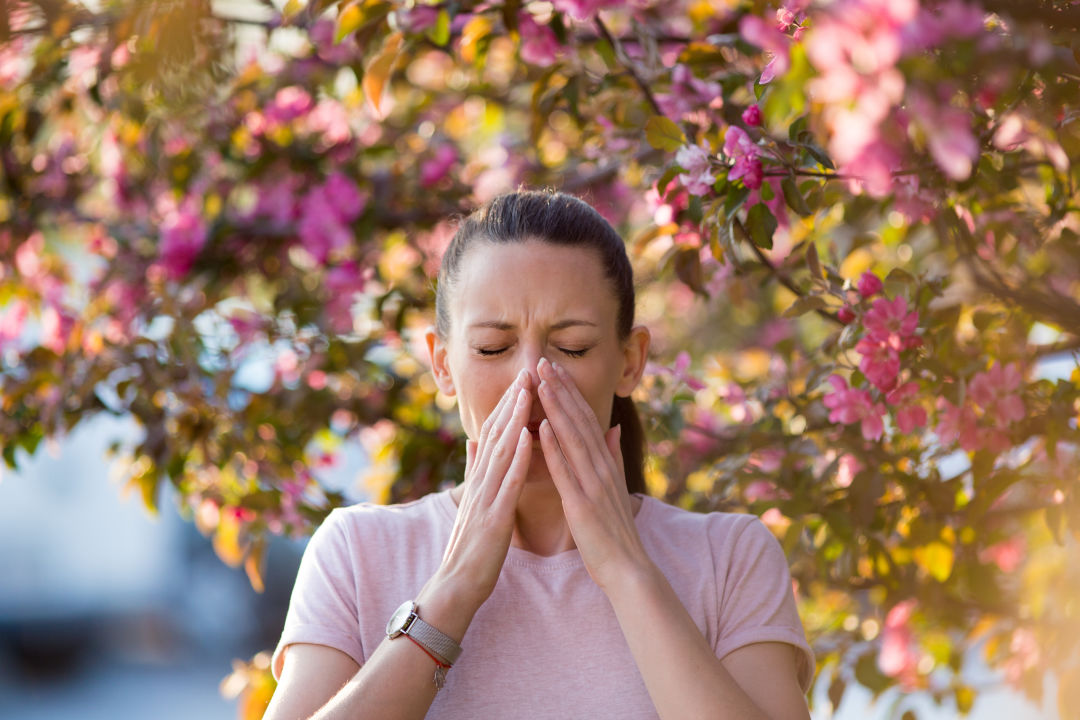Know Thy Sneezes: The Difference Between Seasonal Allergies and COVID-19

Seasonal allergies affect the upper airways, says allergist Dr. Hugh Windom, while COVID-19 affects the lungs and chest.
Image: Shutterstock
With Florida's peak allergy season upon us, it may be difficult for allergy sufferers to determine the difference between their standard symptoms and those of the novel coronavirus.
While symptoms may appear to overlap—who among us hasn't wondered whether our sore throat is due to pollen or COVID-19 these days?—there are clear distinctions between the two conditions that should put those with allergies at ease. Sarasota allergist Dr. Hugh Windom answered some questions and reassured us about our concerns. (His answers will make you feel better!)
What are the main symptoms of seasonal allergies, and how do they differ from COVID-19?
Seasonal allergies will always affect the upper airways, causing an itchy, runny nose and watery eyes. Those who suffer from asthma may also experience these symptoms. Seasonal allergies tend to flare at a particular time of year—February, March and April—whereas viral symptoms could occur any time.
Symptoms of the coronavirus have much more to do with the chest and lungs, and include coughing and shortness of breath, along with persistent fever. Loss of smell is another newly discovered symptom of COVID-19.
Confusion over this difference will subside as the peak of allergy season passes. We just passed Florida's tree pollen season, which is a significant allergen for many patients.
What about those who have never experienced seasonal allergies before?
If this is your first spring season experiencing allergies, look out for those upper airway symptoms, especially the itchy, runny nose. While it is common for children to experience allergies for the first time, adults have typically already experienced a bout or two, even if at a lesser degree, in past spring seasons.
Determining what you are allergic to may most challenging, especially in Florida, where plants bloom year-round.
How are those with asthma being affected by the virus?
You can culture the virus through the nose, but there aren't many nasal symptoms with COVID-19. It predominantly impacts the lungs, which was a concern for asthmatics at first. They were thought to be high-risk, but it turns out asthma is not a significant risk factor. Those with high blood pressure and diabetes are at much greater risk.
This is information we try to reassure our asthmatic patients with—that they are at no greater risk than non-asthmatics.
What are your tips for managing seasonal allergies at home?
Make the usual efforts to avoid your allergens as best as you can. Staying inside due to the virus has actually helped those with outdoor allergies. If your allergens are indoors, like dust, mold or pet dander, continue refreshing your home often. You can also take over-the-counter antihistamines, or use nasal sprays sold at any pharmacy. Our office can also prescribe allergy shots and other medications for severe cases.
Have you seen any patients concerned they have COVID-19?
We have sent some patients to get tested, and out of the four doctors in our practice, we have only seen two positive cases. We are continuing telehealth for compromised individuals, but have also seen more in-person visits in the past week or two. Hopefully, as things begin to settle down, and we can see even more patients in person and help them out.
Windom Allergy, Asthma and Sinus Specialists is located at 3570 S. Tuttle Ave., Sarasota. For more information, click here, or call (941) 927-4888.



